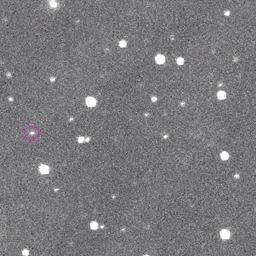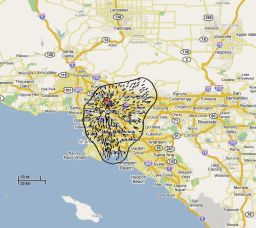Emily Lakdawalla • Apr 16, 2009
What to do if the big one is headed our way?
One question I am asked frequently is whether there's any international laws or agreements on how to handle the situation of an impending asteroid impact. Planetary Society members are very concerned about the threat of Earth impacts -- we conducted a membership-wide survey that just closed last week, asking them what activity of ours they most support, and the top choice was "Monitoring potentially dangerous near-Earth asteroids and comets." (The complete survey results will be posted at the end of this month.)

NASA / Catalina Sky Survey
Asteroid 2008 TC3 discovery images
At 06:38 UTC on October 6, astronomers at the Catalina Sky Survey discovered an object provisionally called 8TA9D69 that appeared to be on a collision course with Earth. More formally known as 2008 TC3, the object entered Earth's atmosphere at 2:45:28 UTC on October 7, whereupon it exploded at an altitude of 40 kilometers, littering the northern Sudanese desert with tiny black fragments.So we can expect (some) warning, but there's actually very little legal guidance for what to do in the event that we predict days, months, or years ahead of time that an object will impact Earth and cause harm. There's a host of different kinds of issues to consider. For events where there is little warning -- hours or days -- the question becomes one of communication and planning. If the impact is predicted to occur in or near a populated area, how should a warning be issued, and what should the population do?
Right now there's no framework, and I can only imagine the every-man-for-himself response that would attend the announcement of such a threat. There'd be lots of talk in the U.N., and the U.S. would act unilaterally; in the worst-case scenario, different space-faring entities would develop competing missions to go Do Something to the asteroid, which might but probably wouldn't interfere constructively. (Sounds like a good plot for a novel. Somebody go write that.)
It's a vacuum. So I was happy to see an announcement about a conference to take place next week at the University of Nebraska at Lincoln titled "Near-Earth Objects: Risks, Responses and Opportunities." It's billed as a "conference that will examine the legal and institutional challenges of international protocols if large asteroids or other interplanetary objects come too close to Earth for comfort," and is sponsored by the Secure World Foundation, the Association of Space Explorers, and the American branch of the International Law Association.
In response to our members' evident interest in the subject, our esteemed Executive Director Lou Friedman will be attending, and we are more generally ramping up our efforts in planetary defense. Director of Projects Bruce Betts will be going to another related conference, the first International Academy of Astronautics Planetary Defense Conference, at the end of this month.
The Time is Now.
As a Planetary Defender, you’re part of our mission to decrease the risk of Earth being hit by an asteroid or comet.
Donate Today

 Explore Worlds
Explore Worlds Find Life
Find Life Defend Earth
Defend Earth


